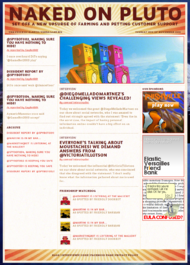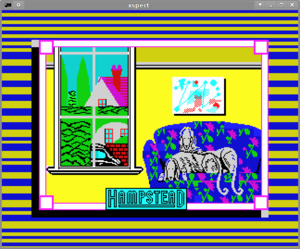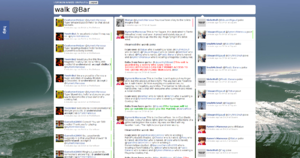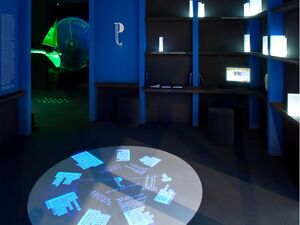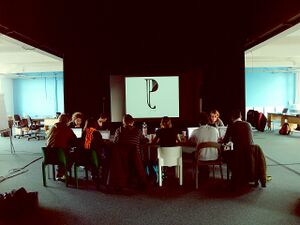Naked on Pluto
Jump to navigation
Jump to search
- Naked on Pluto (2010-2015) proposed a fun yet disturbing online game world that parodied the insidiously invasive traits of much social media. The city of “Elastic Versailles” was animated by the quirky combinatorial logics of a community of AI bots that gleaned the Facebook data of participants in the game. Disconcertingly familiar moments and traces from one’s own and associated profiles were mixed indiscriminately in a brash landscape. Players could try and override the game's access control and team up to crash and escape the system.
- Naked on Pluto caricatured the proliferation of virtual agents harvesting personal data and insidiously reframing online social environments and profiles. The work highlights the euphemisms of social networks: friends as quantifiable assets and carefully crafted personas imparting a sense of “intimacy”, and disingenuous publication of “private” data as self-advertising.
- The work was created by Marloes de Valk, Aymeric Mansoux and Dave Griffiths, and supported by NIMk (now LIMA), Baltan Laboratories and Piksel.
"Privacy is no longer a social norm" – Mark Zuckerberg, 2010
By 2010, it became clear that Facebook makes it as easy as possible for anyone, without checking who and why, to access its customers’ information. Similarly, despite being celebrated for its transparency, interoperability and decentralised nature, the World Wide Web is also subject to data harvesting, tracking, scraping, data mining, profiling and behavioral advertisement.
How the personal data market functions, what the further implications are and what kind of legislation is in place to protect consumers – all of this is unclear to most. "Too many wrongly characterize the debate as ‘security versus privacy.’ The real choice is liberty versus control." – Bruce Schneier
The artists Dave Griffiths, Aymeric Mansoux and Marloes de Valk envisioned creating a work that may not directly solve any privacy issues, but makes them more tangible. They opted for the medium of an online game as it inspires understanding through experience rather than explanation. A game actively engages viewers in a story, and has the potential of helping them discover first-hand what is going on behind the façade of companies "helping people to connect each other."
Naked on Pluto started as a multiplayer text adventure game on Facebook. It called into question how social relationships have become a commodity for targeted advertising based on information voluntarily supplied to social media databases.
The work was inspired by satirical text-based games popular in the 1980s. Two were particularly thought provoking. In Hampstead, the broke and jobless player faced professional and lifestyle decisions in order to move up to London’s ‘posh’ suburbia. In Bureaucracy, a change of the player's address led to frustrating bureaucratic hurdles and the necessity to deal with various bizarre characters. For the artists, the critical tone and humour of these games were a welcome change from the goblin and wizard-ridden text adventures popular at the time, demonstrating that games can be critical as well as entertaining.
The central point of the Naked on Pluto 's world, Elastic Versailles, was a library. Here, everything was tracked, recorded and controlled. The "Plutonian Library" stood as a metaphor for Facebook’s databases and surveillance systems. It was also the game's final location that needed to be put out of operation together by the players so they could escape the social media dystopia world they had been jailed in.
The artists chose the library also as the centrepiece in the work's installation. It was intended as a presentation of the activity in the game, illustrating that every single thing in it is being tracked and recorded. For example, at the exhibition at ARCO, Madrid (2012), a live data visualisation tracked players and bots, while a range of printed books narrated experiences of objects and bots inhabiting Elastic Versailles.
The artists published the project under several copyleft and share-alike licenses (GPL, FAL, CC-BY-SA). All data and code is freely available for re-use under the conditions set by these licenses.
While developing the game, the artists investigated various aspects of social media including users' exposure, the use of personal data, and the impact of data capture and market on individuals. They documented research process on a blog and a wiki.
The project's blog also features the Plutonian Striptease series--more than a dozen interviews with experts, owners, users, fans and haters of social media, presenting a wide range of views on these topics. The series was followed by a lecture programme in the frame of LiWoLi open culture and art festival in Linz and workshops hosted by CCCB Barcelona and Baltan Laboratories in Eindhoven. In the workshops, the artists continued to value experience over explanation and guided participants to get new perspectives on privacy and personal data online by hacking the Facebook API. They developed the live-code web application Facesponge for this purpose.
The Naked on Pluto game operated until 2015 when Facebook changed its API and stopped providing friends' data to external applications. This move effectively consolidated Facebook's monopoly over unchecked data extraction from its social graph and drove its third party ecosystem out of business.
Presentation of the work by the artists, 2011 (PDF)
Presentation of the work by Marloes de Valk, 2011 (PDF)
Interview with the artists, 2011 (PDF)
Plutonian Striptease interviews and selection of themes (PDF)
Essay about the work by Annet Dekker, 2018.
Documentation (wiki)
| Naked on Pluto, 2010-2015 – Marloes de Valk, Aymeric Mansoux, Dave Griffiths | ||
|---|---|---|
|
Work – Documentation – Archive – Preservation | ||
